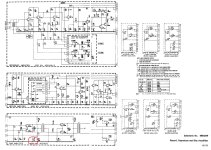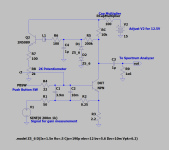Hey there,
Id like to find a way to test transistors for noise. I want to test a bunch of the same type in order to find the lowest noise ones. I do have a peak atlas that does everything else just fine.
Now the first idea im having is to build some kind of circuit that puts the transistor in a prominent position, socket that and then i could maybe use my audio precision analyzer to test for noise? Is this a valid idea? If so, does anyone know a circuit that will work for this?
Thanks
Id like to find a way to test transistors for noise. I want to test a bunch of the same type in order to find the lowest noise ones. I do have a peak atlas that does everything else just fine.
Now the first idea im having is to build some kind of circuit that puts the transistor in a prominent position, socket that and then i could maybe use my audio precision analyzer to test for noise? Is this a valid idea? If so, does anyone know a circuit that will work for this?
Thanks
The transistor you are testing will have to be put in some kind of amplifier, which will increase the noise to a level that can be measured.
I measured microphone preamps, setting the preamp gain to 60dB, with a short circuit input, so if the noise was -68dB, then the noise figure is -128dB.
When the transistor that we used for the differential input stage became obsolete, another transistor was tried, but it had 6dB higher noise.
It was a long time ago, but that is what I would do.
I measured microphone preamps, setting the preamp gain to 60dB, with a short circuit input, so if the noise was -68dB, then the noise figure is -128dB.
When the transistor that we used for the differential input stage became obsolete, another transistor was tried, but it had 6dB higher noise.
It was a long time ago, but that is what I would do.
lowest voltage or lowest current noie? You cannot have both at the same time.
Lowest noise is a matter of the source impedance of your application.
So looking for lowest noise voltage is not the ultima ratio.
Lowest noise is a matter of the source impedance of your application.
So looking for lowest noise voltage is not the ultima ratio.
Thanks guys,
honestly i dont even know if voltage or current noise is what i need to look for. Essentially i need to replace a bunch of transistors in an existing amp and i just want to find the ones with the lowest noise figure out of a bigger batch
honestly i dont even know if voltage or current noise is what i need to look for. Essentially i need to replace a bunch of transistors in an existing amp and i just want to find the ones with the lowest noise figure out of a bigger batch
Thanks guys,
I cant use the existing amps… they are from a tape machine and dont work outside of the frame. Plus id like to find a setup, that eliminates as much interference as possible…. and use it for similar jobs in the future. What do you guys say to the schematic i attached? It uses one transistor (dut) and one opamp for 60dB of amplification.
I cant use the existing amps… they are from a tape machine and dont work outside of the frame. Plus id like to find a setup, that eliminates as much interference as possible…. and use it for similar jobs in the future. What do you guys say to the schematic i attached? It uses one transistor (dut) and one opamp for 60dB of amplification.
The NEC datasheet circuit asks for a tube voltmeter when i read this correctly. Also asks for a BPF - a bandpass filter?
As i pointed out there is no one low-noise transistor that fits all needs.
I consider it useless to select transistors in an arbitrary kind of test setup and expecting optimal results in the destination application.
It would be helpful if you gave detailed information concerning the application.
I consider it useless to select transistors in an arbitrary kind of test setup and expecting optimal results in the destination application.
It would be helpful if you gave detailed information concerning the application.
Thanks Bucks, here is a schematic to the amps i want to use these in:
But why would it not be possible to select transistors for noise? Im not looking for a perfect transistor, i just want to find the ones with the lowest noise figures among a batch of the same type of transistor. The ones specified by the manufacturer. My idea was to have an amp like the one i attached (#5), socket the transistor and feed that to my audio precision. Make a noise measurement, swap transistor, make noise measurement and so forth….
But why would it not be possible to select transistors for noise? Im not looking for a perfect transistor, i just want to find the ones with the lowest noise figures among a batch of the same type of transistor. The ones specified by the manufacturer. My idea was to have an amp like the one i attached (#5), socket the transistor and feed that to my audio precision. Make a noise measurement, swap transistor, make noise measurement and so forth….
Attachments
The input transistor is pretty vintage. There are current transistors that are equivalent. Who made that machine? It uses an input transformer so its not clear what the real source impedance is. The transistor noise spec at 1 KHz is 1 dB with 10K Ohms or around 12 nV/rtHz.
The most straightforward way is to emulate the circuit conditions Vce and Ic and load resistor and measure the noise at the resistor. The AP can measure the noise when used a a narrow band filter.
Screening out noisy transistors is an accepted quality effort since those are more likely to fail early.
The most straightforward way is to emulate the circuit conditions Vce and Ic and load resistor and measure the noise at the resistor. The AP can measure the noise when used a a narrow band filter.
Screening out noisy transistors is an accepted quality effort since those are more likely to fail early.
Is it a tape head amplifier?
When I measured the different microphone amplifiers that we made, there was little difference unit-to-unit; all measured within a dB or so. They were likely all from the same batch.
There was only a difference when the transistor part number had to be changed.
When I measured the different microphone amplifiers that we made, there was little difference unit-to-unit; all measured within a dB or so. They were likely all from the same batch.
There was only a difference when the transistor part number had to be changed.
the voltage noise has a component determined by the base resistance, the thinner the base the higher the gain, but also higher voltage noise, so for low impedance amplification the transistor's construction does play a role. for higher impedance applications high gain helps driving voltage noise and current noise away from each other. The only difference I found between manufacturers of the same typenumber is when measuring 1/f noise, a measure of a clean process. Just by looking at the dB needle you can see the difference between various manufacturers. Toshiba was always a winner.
Ok guys, maybe im not clear in my explanation. But why would this have to do anything with the circuit? I just want to build myself a transistor tester that i can use for all kinds of transistors in all kinds of circuits. Say i have 30 pieces of 2N5088. I just want to find the lowest noise ones among the batch. What about the idea of building the circuit in post #5 and connecting that to my audio precision? The test setup would be the same for all transistors and i should get different noise readings i assume… please correct me if im wrong.
You are quite clear in your explanation. You think by using some arbitrary test setup you can find the lowest noise transistor for your application.
And you think this will work in any arbitrary application circuit.
Which is an illusion.
I assume you are considering Q1, the playback head amp.
In that case the first thing to do is degaussing the playback head.
Swapping transistor at this instance is pointless imho, I played that game long time ago with a Revox A77 - without significant outcome.
And you think this will work in any arbitrary application circuit.
Which is an illusion.
I assume you are considering Q1, the playback head amp.
In that case the first thing to do is degaussing the playback head.
Swapping transistor at this instance is pointless imho, I played that game long time ago with a Revox A77 - without significant outcome.
No, i have faulty transistors that i need to replace. Im not trying to improve the machine or anything like that. The post below yours has a link to a transistor test circuit. And my link is a transistor test circuit as well. I just really do not understand why you think that this idea is an illusion. Just trying to learn. Not being a smart ***. But test equipment should not need any info on the circuit in order to test a component….You are quite clear in your explanation. You think by using some arbitrary test setup you can find the lowest noise transistor for your application.
And you think this will work in any arbitrary application circuit.
Which is an illusion.
I assume you are considering Q1, the playback head amp.
In that case the first thing to do is degaussing the playback head.
Swapping transistor at this instance is pointless imho, I played that game long time ago with a Revox A77 - without significant outcome.
Thanks Jackinny,
i did find this circuit as well but i do not have a spectrum analyzer. So its no option. Again, whats wrong with schematic #5 and using my audio precision in order to test the noise of the circuit? The transistor would be the only component that is being changed and therefore the differences of noise measurements should tell me which ones are the most quiet… why would this not work?
i did find this circuit as well but i do not have a spectrum analyzer. So its no option. Again, whats wrong with schematic #5 and using my audio precision in order to test the noise of the circuit? The transistor would be the only component that is being changed and therefore the differences of noise measurements should tell me which ones are the most quiet… why would this not work?
Aha, there are dozens of transistors in the circuit diagram.No, i have faulty transistors that i need to replace.
I am out here.
- Home
- Amplifiers
- Solid State
- Test transistors for noise

